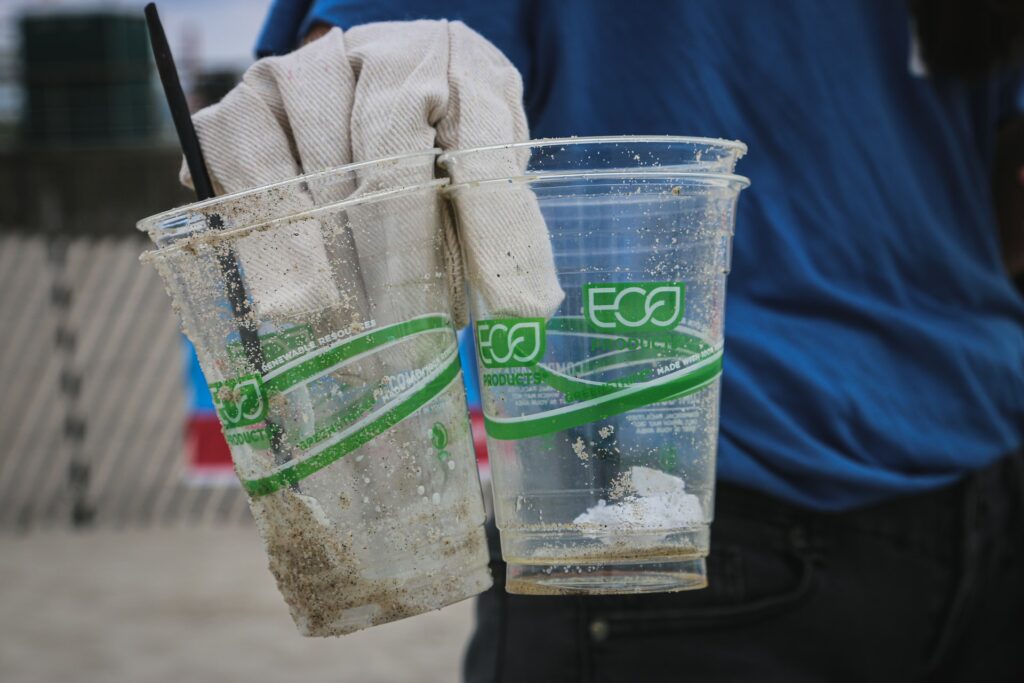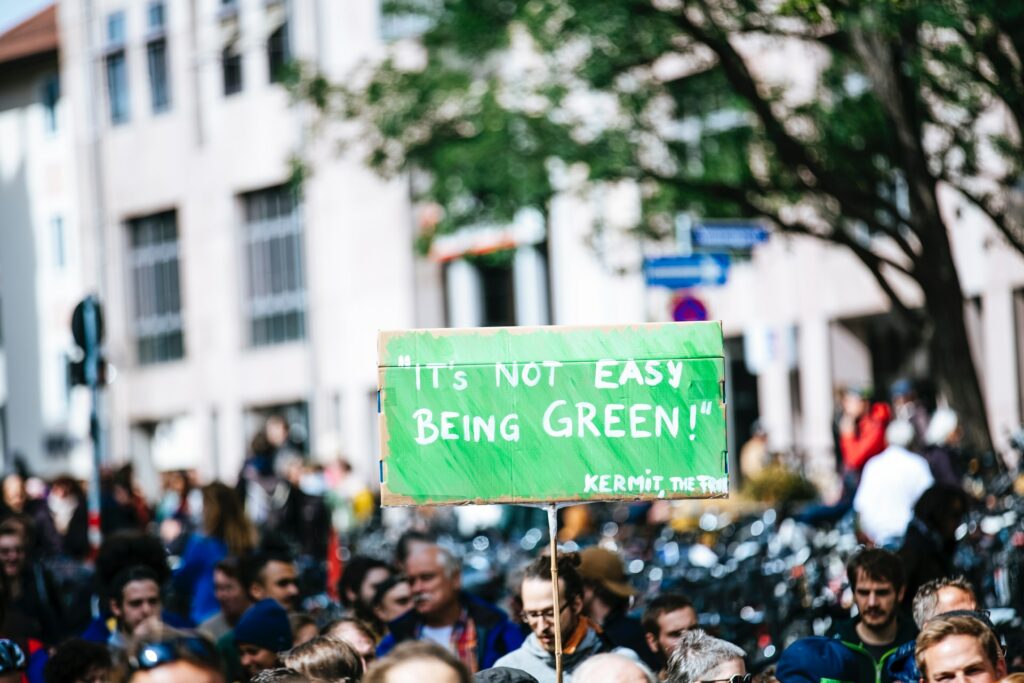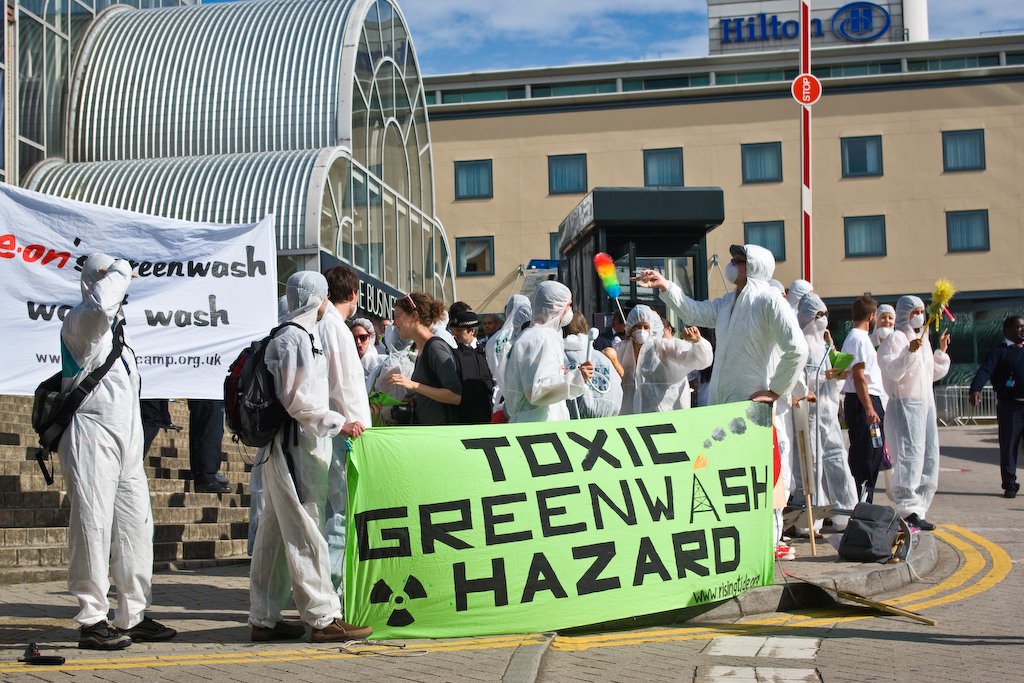Greenwashing is when a company makes false or misleading claims about its sustainability efforts.

Where does the term come from?
‘Greenwashing’ is the environmental version of ‘whitewashing’, which is typically used when a company or institution covers something up.
Some people include social issues (for instance, claims about benefits to a community or societal group) in greenwashing, whereas others consider this separately – sometimes called ‘bluewashing’.
‘Greenwashing’ was coined by environmentalist Jay Westerveld in 1986 in an essay about hotel towel washing policies. He argued not washing towels every day was less about saving water and more about saving money.
Why do companies greenwash?
Many of us want to know our money is going to the ‘right’ places – of course we feel better about our spending and the planet when we think a company operates in a sustainable, caring, responsible manner. For businesses that greenwash, it’s very often just about marketing and PR – and, unfortunately, it works.

Is there any truth in greenwashing?
Sometimes a company may have good intentions and may just be trying to showcase what gains they’ve made in – for example – reducing their carbon footprint. Greenwashing doesn’t necessarily mean these claims aren’t true – just that it doesn’t matter if one small advance is made if the rest of the company’s operations are incredibly damaging to the planet. In other cases, yes, it’s just cynical marketing.
The problem is that the more consumers hear about greenwashing, the less likely they are to trust any claims at all. And that isn’t fair to the people genuinely making a difference.
What are some examples of greenwashing?
When BP rebranded with a tagline ‘Beyond Petroleum’ to showcase their investments in renewables, they were criticised for greenwashing because they continued to be a major producer of fossil fuels.
Another general example is an airline that might be offsetting its carbon output by buying carbon credits – but without making any reductions in its emissions.
One other example cited by the US Federal Trade Commission (FTC) is a garbage bag described as ‘recyclable’ – bags aren’t separated from trash at landfills, so this would be an unrealistic, misleading claim.
What’s the fix?
We need strict regulation to monitor company claims and more consumer awareness of how to spot greenwashing.
Statements on environmental policies or impacts must be properly assessed by official agencies, and companies should be penalised if they make false or misleading claims. This takes the pressure off the individual consumer and helps us make informed choices.

How do we spot greenwashing?
This is the tricky bit, as we don’t all have time for in-depth research every time we make a purchase. Some quick things to look out for:
- A vague claim with no data or proof to back it up. How is this t-shirt made sustainably? What does that mean? Usually if a company has the information, they’ll provide it. We need more than just ‘eco-friendly’ or ‘natural’.
- The main product. If an oil company is trying to convince you its operations are environmentally friendly, while continuing to mine for oil and seeking new opportunities, you can assume it’s just greenwashing.
- Lack of transparency. If there’s no honesty about how a company can improve itself (and there are always ways to improve) but lots about how ‘eco-friendly’ and ‘green’ it is, you might be right to view their claims with an air of suspicion.
If you’re responsible for marketing your company’s sustainability credentials, here are some SOP tips:
- Be honest. It’s better to show you’re trying, even if there’s still some way to go, rather than BS-ing your customers.
- Be precise. Show how you’ve cut emissions and by how much. We want to see the data!
- Join the dots. Tell us how one action leads to a more sustainable operation.
- Do the work! The best way to avoid greenwashing is to actually sit down and pick apart your business, assessing every impact and how it can be reduced. Too many companies want a quick fix – and that’s very often how we end up with greenwashing.

Some good news!
- The US FTC has charged several companies in relation to greenwashing.
- The US Securities and Exchange Commission has begun investigations into environmental, social and governance (ESG) metrics to ensure companies are making honest claims.
- The French government has tightened up its advertising standards and companies accused of greenwashing could be fined up to 80% of the cost of the campaign. From January 2023, businesses must provide verifiable information to assert carbon neutral claims.
- A New York resident is taking H&M to court over the claim its clothes are made from sustainably sourced materials. H&M is one of the most well-known fast fashion brands. In 2019, the brand’s ‘Conscious’ collection was investigated by the Norwegian Forbrukertilsynet (Consumer Authority) and was told its sustainability claims were not properly evidenced.
- The UK government has also opened investigations into three fashion brands.
- Here’s a list of companies accused of greenwashing.

Do you have an example of *real* green marketing – something that’s not just greenwashing? Celebrate the good guys in the comments below!
Sources
Business News Daily, What is Greenwashing?
Earth.org, What is Greenwashing?
Environmental Sciences Europe, Concepts and forms of greenwashing: a systematic review
Investopedia, Greenwashing
New York Times, How greenwashing fools us

